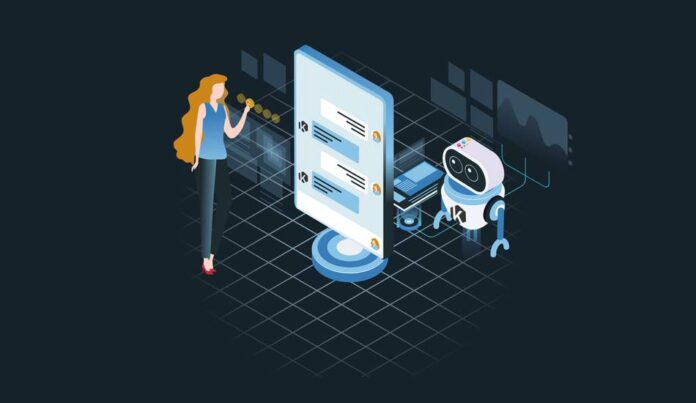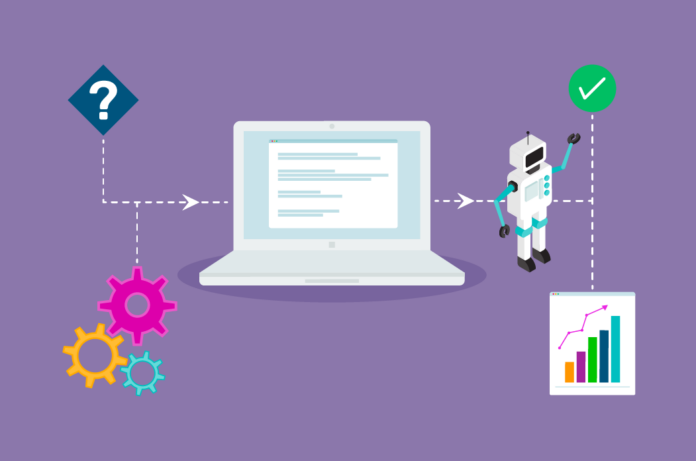AI is the leading force revolutionizing modern business. Applications cover a wide range, from customer interaction to reform operations. This piece explores how AI assists businesses in various aspects and organizes them into four major sections.
1. Enhancing Business Engagement

In the dynamic business setting, customer engagement represents a foundation for success. AI has become a game changer, helping businesses connect with their audience in ways never seen before.
Here, we will discuss four effective ways AI changes business engagement, making interactions into lasting relationships. While businesses use artificial intelligence to improve the quality of customer satisfaction, students facing academic difficulties may also get support online.
Similarly to how AI influences engagement in the company setting, there are specialist-based resources such as writing services for students requiring aid with their studies.
Technological leaps in business and education can create rich experiences and their successful endings. Students who require guidance in their studies are encouraged to research a reputable essay writing company and communicate with qualified experts ready to help. Now, let us discuss how AI augments business engagement.
2. Tailored Client Experiences
In the age of hyper-personalization, AI plays the role of an architect designing personalized customer journeys. AI assesses massive data to identify personal preferences, allowing companies to tailor products, services, and messages that tap into individual passions. This individualized approach engages the audience, develops lasting relationships, and ensures total customer loyalty.
3. Intelligent Chatbots

AI-driven chatbots revolutionize customer support to unprecedented degrees. With these intelligent virtual assistants, clients get instantaneous and precise replies to their inquiries, which results in a support system which is always available. This upturns customer gratification and guarantees that businesses keep a consistent presence depending on the needs of their target audience.
4. Predictive Analytics
The AI technology with projecting analytics identifies customer needs before the clients themselves and offers a strategic edge. By examining historical and current data, AI predicts trends and behaviors so companies can develop a strategy for keeping this step ahead.
Based on these observations, anticipating audiences’ needs allows companies to act as trailblazers, showing deep knowledge about customer expectations and desires.
5. Virtual Assistants

Outside of customer servicing, AI impacts most activities in the operation itself through applications for virtual assistants. In helping employees handle everyday tasks and workflows, these AI-powered assistants enable them to redirect their energy towards more productive customer-oriented activities.
This increases efficiency and helps create an atmosphere where innovation and personalized attention flourish.
6. Gaining a Competitive Advantage
In an unyielding quest for market dominance, companies resort to AI as the impetus to obtain a competitive gain. With the aptitude to generate valuable insights from millions of raw customer data, AI has become a strategic necessity.
As such, we will consider four fundamental ways in which AI does not only inform businesses of the current state of affairs within their respective industries but helps push them forward, driving innovation, data-driven decision-making, and, above all else, unique customer relationships.
7. Market Intelligence

Fast transformations and growing consumer demands characterize the market arena of today’s business. AI acts as the silent vigilante, patiently crunching various market data. Recognizing patterns, forecasting trends, and supplying the actionable perspectives businesses require to avoid other market players is what AI-provided vision does.
In market intelligence, Artificial Intelligence succeeds beyond the position of a lone observer, guiding strategy with its adaptability in an uncertain world.
8. Customized Product Offerings
In the days of personalization, trades that position products and services to serve particular requirements are ahead. AI-powered market analysis is a blueprint for tailored product and service policies.
Therefore, organizations can tailor their production by reading individual inclinations and market pattern changes. This not only addresses customers’ individual needs but also creates an image whereby a business is seen as dynamic and responding accordingly in what can be termed topsy-turvy market situations since one-size-fits-all approaches are fading out.
9. Rapid Innovation

Innovative speed is one of the key factors controlling success in business today. The innovation is then accentuated by AI, which has the potential to process and analyze large data sets automatically.
AI-driven enterprises benefit from the accelerated identification and introduction of new products or enhancements. In turn, they improve their competitive edge by bringing innovative solutions to market sooner.
10. Enhanced Decision-Making
Nowadays, when we are living in the information age, timely and wise decision-making is considered a mark of performing businesses. Real-time data analysis by AI helps decision-makers have valuable insights regarding the same. In raising the quality of decision-making, AI turns into a navigational system that guides businesses through rough terrain.
This competitive advantage means that all choices based on the current market dynamics are well-considered and leave competitors who use traditional methods directionless.
11. Maximizing Business Profitability

In any organization, it is the unending task of achieving profitability. As such, AI arises as a key business partner in the race toward productivity with a keen ability to improve efficiency and promote effective profitability. This section examines four essential ways AI revolutionizes businesses, not just on their economic standing but also on why they may or may not become adaptive agents within an open market system.
12. Dynamic Pricing Strategies
With commodity dynamics, AI has a choreographer role that balances and harmonizes multiple price strategies with its dynamic adjustments. However, AI algorithms demonstrate the potential for real-time analysis of market dynamics that enable pricing structures with optimized profitability where changes in necessary conditions occur. This approach of dynamic pricing can assist businesses to become competitive and utilize the market opportunities that enable them to increase their revenue.
13. Inventory Management

Inventory management is a balancing act between cost and customer satisfaction. Computing further contributes to this equation, adding the inventory levels with absolute accuracy.
AI observance of demand pattern analysis, supply chain dynamics, and market fluctuation would show that stock levels are always correct for companies. This reduces inventory costs and ensures that products are available whenever demanded, driving profits.
14. Precision Marketing
The resource management process in marketing is continuous, and AI adoption ensures accuracy that allows campaigns to reach their intended audiences. In big data, AI makes marketers sharpen their attention on specific groups.
This also helps direct the resources towards regions where they produce the highest returns and hence reduce marketing costs, directly influencing profitability.
15. Operational Efficiency

AI is like a detective, revealing inefficiencies that acted as camouflaged leakages to profitability. It reduces cost because it streamlines processes and identifies wastage channels in multiple aspects of the business. It promotes efficiency by releasing funds and allocating resources to growth initiatives and strategic investment projects.
16. Boosting Employee Productivity
As an artifact that helps achieve the radical goals of this purpose, improved productivity in today’s workplace remains a challenge.
This subsection reveals how artificial intelligence sets the free time from laborious, repetitive procedures and data-driven projections of skills training.
17. Workflow Automation

Employee productivity hinges on the efficiency of daily workflows. AI then becomes the conductor of successful operations by eliminating repetitive acts. This frees employees from trite duties and allows them to focus on a job’s smaller, imaginative aspects.
Empowered by artificial intelligence, automation in the workplace pours its energy into capabilities that meet human inventiveness requirements for productivity and enjoyment.
18. Training and Development
The modern workplace is in a constant phase of evolution; thus, skill development is a never-ending practice. There are AI crafts training programs that act like personal tutors tailored to particular employee requirements.
Through performance data analysis and skill gap detection, AI makes training an integral part of work as a strategic investment into competence improvement guaranteed by more efficient human capital. However, this individualized method not only boosts the performance of specific skills but also elevates the power of a collective company.
19. Time Management Tools

Effective time use is one of the fundamental principles in aiming at individual and collective efficiency. AI-based tools are indispensable in this task as they help with work scheduling and prioritizing tasks. With the help of AI algorithms to analyze work patterns and deadlines, employees can manage their time efficiently. Also, these tools increase individual productivity and create a work culture in which time is managed effectively for better outcomes.
20. Data Analysis Support
Quickly identifying priceless insights within this short time is essential in the information era. AI guarantees the availability of data for decision-making by employees in automated analysis procedures. This AI-employee relationship helps to turn the challenge of data into a resource; thus, we are on our way toward an informed decision culture whose foundation is productivity.
Conclusion
Artificial intelligence is a technological instrument transforming business in our ever-changing reality. Elevating engagement and profitability, efficiency, and competitiveness has become necessary. The goal of every business is to embed AI in its strategies for achieving sustainment of success.
With the upgrade, you make your venture to be relevant but and competitive in the demands of the digital realm. Therefore, take advantage of the available tech trends to boost your business. Find the working systems if you want to be ahead of other competitors.









